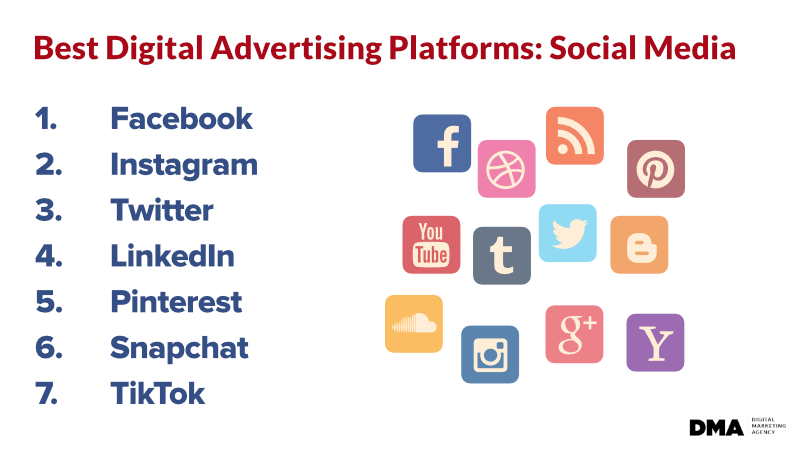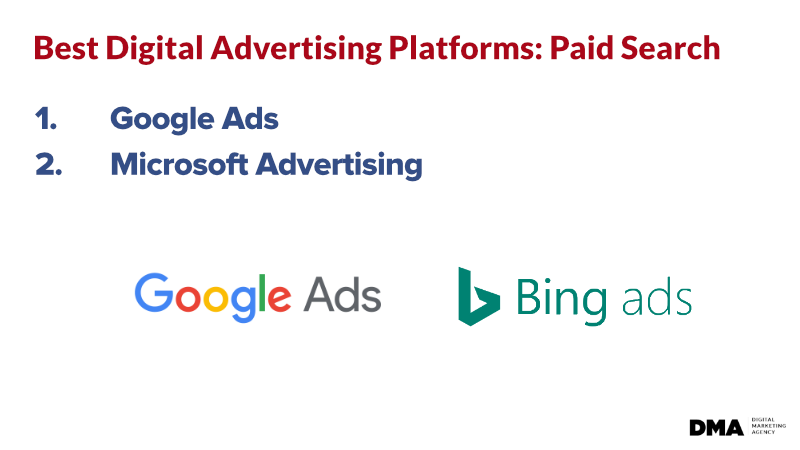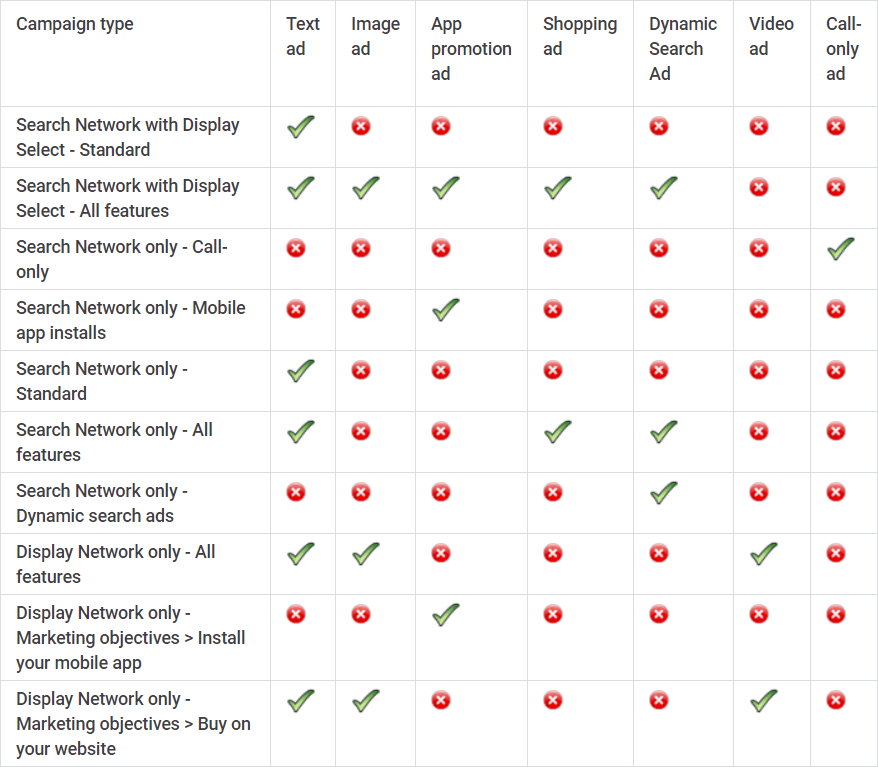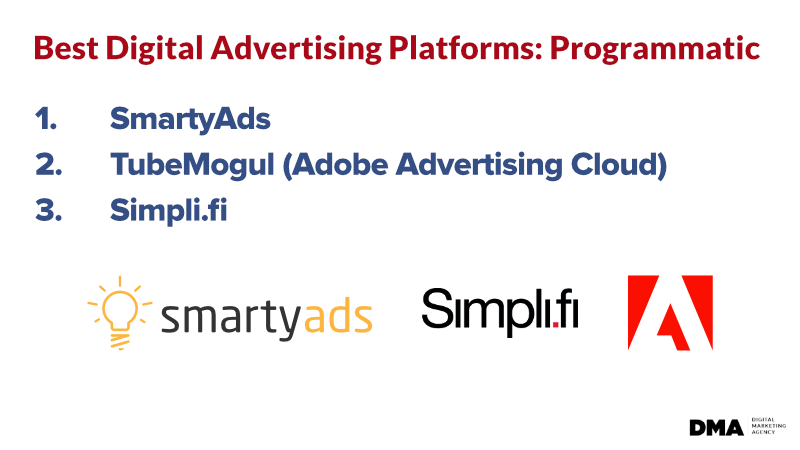SEO
Free SEO Analysis
SEO Services
Content Marketing Services
Local SEO
Link Building Services
Specialized SEO Services
PPC
REPUTATION MANAGEMENT
Free Reputation Management Analysis
Reputation Management Services
Review Management Services
Specialized Reputation Management Services
CEO Reputation Management
Brand Enhancement
Business and Directory Listings
Comprehensive Reputation Management Audit
SOCIAL MEDIA
Free Social Media Analysis
Specialized Social Services
WEB DEVELOPMENT
Free Website Analysis
Web Design Services
Mobile Development Services
Website Maintenance Services
Specialized Development Services
MARKETING AUTOMATION
Free Marketing Automation Analysis
Specialized Marketing Automation Services
Comprehensive Marketing Automation
INDUSTRIES
ABOUT DMA
PPC
12 Best Digital Advertising Platforms to Get Results in 2023
Request a quote
Its Fast, Easy & Free
Executive Summary
- When you use the right digital advertising platforms, you’ll be able to get your ads in front of the right people
- Your target audience is on social media in pretty large numbers. According to Emarketer, 90.4% of Millennials, 77.5% of Generation X, and 48.2% of Baby Boomers are active social media users.
- According to Google, advertisers make $8 for every $1 they spend on Google Ads.
To grow your business online, you need traffic. That’s where it all starts.
But SEO takes time.
To get more traffic now, while you wait for your SEO efforts to pay off, you need to use digital advertising.
Of course, there are quite a few digital advertising platforms available, so how do you decide which to use?
In this article, we’ll share the 12 best digital advertising platforms for social media advertising, paid search advertising, and programmatic advertising. Then, you can choose which platforms to invest in based on where your audience is most likely to be.
Let’s get started.
12 Best Digital Advertising Platforms
With online advertising, you’ll be able to generate more leads, boost brand awareness, and increase sales. But it’s important to understand the differences and similarities between the top digital advertising platforms so you can choose the ones that work for you and your business.
When you use the right digital advertising platforms, you’ll be able to get your ads in front of the right people, those who are interested in the products or services you have to offer.
We’ve put together this list to help you find the best online advertising platforms that you can use to attract and convert your target audience with the best return on ad spend (ROAS).
Social Media Advertising

Nearly 50% of the world’s population uses social media (Statista). And 54% of those on social media use it to research products (GlobalWebIndex).
Your target audience is on social media in pretty large numbers. According to Emarketer, 90.4% of Millennials, 77.5% of Generation X, and 48.2% of Baby Boomers are active social media users. Plus, it’s the most relevant advertising channel for 50% of Gen Z (Adobe).
No matter why they’re on social media—professional networking, chatting with friends, staying connected to family and friends across the world—they are on social media. In large numbers.
Because so many people regularly use social media, advertisers spend a lot of money advertising on these platforms. In 2019, social media ad spend totaled more than $89 billion (Statista).
So far in 2020 ad spend on social media is up nearly 14% YoY, according to Statista’s numbers.
Why is social media advertising so popular? There are two big reasons:
Targeting.
You can reach a very specific, highly-targeted audience with social media.
Ad formats.
Social media advertising has several different ad formats so you can advertise in a way that makes sense for your brand.
Let’s take a look at seven popular social media networks that you should consider for your advertising efforts.
Facebook has 2.6 billion monthly active users and a user-friendly advertising platform you can use to reach just the right ones.
The platform has several ad formats to choose from:
Photo:
Clean, simple format to feature engaging imagery and copy
Video:
Range of lengths and styles
Stories:
Customizable, edge-to-edge experience
Messenger:
Help people start conversations with your business
Carousel:
Showcase up to ten images or videos in a single ad
Slideshow:
Video-like ads made of motion, sound and text
Collection:
Let people discover, browse and buy what you offer
Playables:
Offer people an interactive preview before they download an app
As for targeting, Facebook offers three options you can use to target exactly who you want:
Core Audiences
let you define an audience based on things like age, interests, geography, and more.
Custom Audiences
help you get back in touch with people who have engaged with your business, online or off.
Lookalike Audiences
let you reach new people whose interests are similar to those of your best customers.
2. Instagram Advertising
Since Instagram is owned by Facebook, you can use the Facebook Advertising Manager to run your Instagram ads.
Instagram has more than 1 billion monthly active users and 90% of those users follow at least one business account.
This makes Instagram advertising a great choice—especially if you’re targeting mobile users.
Instagram offers these ad formats:
Photo:
Clean, simple, and beautiful photos that can be square, landscape, or portrait
Video:
Visually immersive ads up to 60 seconds long
Carousel:
People can swipe to view additional photos or videos in a single ad
Stories:
Creative, engaging and immersive full-screen ad format
Explore:
Reach people in a discovery mindset
Instagram offers the same targeting options as Facebook, but you can create Instagram ads in a few ways:
Instagram app:
Choose the post you want to promote and turn it into an ad
Ads Manager:
Set up, make changes and see results for all your Instagram campaigns, ad sets and ads
Instagram Partners:
find an Instagram Partner to help you with everything from buying ads to sourcing and delivering creative
Twitter users are not only highly engaged on the platform, but they’re the people who are always on top of the latest news and happenings.
There are more than 330 million monthly active users on the platform, and 145 million daily active users. And, the majority of Twitter users (65%) are 25-years-old or older.
On the Twitter advertising platform, you choose from four Twitter ad formats:
Promoted Tweets:
Reach a wider group of people or spark engagement from existing followers with promoted text, image, GIF, poll or account
Video:
Use engaging ad formats and hyper-targeting capabilities
Cards:
Showcase your best creative, capture attention, and drive people to your site or to take an action in the moment
Brand:
Adding a fun, visually appealing creative element whenever your hashtag is used on Twitter
Twitter also offers several ways to target the audience you want:
Demographics:
Reach people based on location, language, device, age, and gender
Audience Type:
Serve ads based on conversations, events, interests, movies and TV shows, keywords, follower look-alikes, and engagement
Your Audiences:
Target ads to your known audiences, such as your followers and Tailored Audience lists
One of the things that set Twitter apart from other social advertising platforms is being able to use auctions for bidding. With auction pricing, your price per billable action won’t be a fixed rate.
Instead, all advertisers bid on available ad space for the audience they want to reach. This means that the amount you pay for your Twitter ads depends on things like:
How engaging your ad is
The size of your targeted audience
How many other advertisers are also targeting that particular audience
How much you bid
LinkedIn has more than 660 million users in more than 200 countries and territories around the world.
Of those users, nearly 15% are senior-level influencers. These are the decision-makers you want to get your ads in front of.
LinkedIn offers four ad formats:
Sponsored Content:
Promote your company updates to targeted audiences on desktop, mobile, and tablet
Sponsored Messaging:
Deliver native ads directly to your target audience's LinkedIn Messaging
Text Ads:
Add a compelling headline, description, and a 50x50 image
Dynamic Ads:
Get personal with your audience by activating ads customised for each member based on LinkedIn profile data
In terms of audience targeting, LinkedIn requires targeting by geographic location, but you can also target in a multitude of other ways including:
Company connections
Company size
Industry
Job function
Seniority
Member interests
...and a lot more!
You can also use Matched Audiences to create an audience similar to another audience you have.
5. Pinterest Advertising
Pinterest has 322 million monthly active users with an audience that largely identifies as women (70%). People mostly use Pinterest to plan projects, but one-third of Pinterest users in the United States use the platform to keep track of brands and companies they’re interested in (Statista).
Pinterest offers four advertising formats:
Promoted Pins:
Basic ad with a single featured image
Promoted Video Pins:
Tell a strong story with our visually engaging video format
Promoted Carousels:
Use up to five images for Pinners to swipe through
Promoted App Pins:
make it easy for people to discover and download apps, directly from Pinterest
You can target Pinterest ads based on:
Interests
Keywords
Audience
6. Snapchat Advertising
Snapchat has more than 229 million daily active users and according to Snapchat, users spend an average of 30 minutes on the app every day.
Snapchat offers six ad formats:
Single Image or Video:
A fullscreen ad that can be used for many objectives
Collection:
Features four tappable tiles to showcase multiple products
Story:
A series of 3-20 single image or video ads
Lenses AR Experience:
Create memorable, interactive moments that Snapchatters can play with and send to friends
Commercials:
Non-skippable for six-seconds but can be up to three minutes long
Filters:
Artistic overlays that appear after you take a Snap and swipe left or right
You can target your audience on Snapchat based on their interests and behaviors, geographic location, and demographics.
7. TikTok Advertising
TikTok is the newest social media platform, but it has grown immensely. According to Datareportal, TikTok has more than 800 million active users worldwide. The audience is predominantly young with 41% of users aged between 16–24 (GlobalWebIndex).
The advertising platform is very new, but TikTok currently offers fullscreen image and video ad formats that show up on the For You feed for 9 seconds before showing a download card.
You can create a few different types of ads on TikTok:
In-feed native video
Hashtag challenges
Brand takeovers
Lens filters
Paid Search Advertising

Paid search advertising is the ads that show up on search engine results pages. People search online for certain keywords and will see ads related to those keywords at the top, bottom, and to the left of the organic results.
Even if you already show up in organic results, you may want to consider placing search ads.
Why? They actually have a pretty good return.
According to Google, advertisers make $8 for every $1 they spend on Google Ads.
Plus, if you get one of the top ads spots, you’ll show up at the very top of the page, above the organic results. This means that more people will see your ad and become aware of your business.
Search ads also let you serve up ads that are contextual, based on the wants and needs of your target audience.
There are two paid search advertising platforms that we recommend: Google Ads and Microsoft Advertising.
8. Google Ads
Google Ads is the best PPC advertising platform. It leverages Google’s enormous network and user base so you can reach just about any audience.
On the downside, Google Ads is competitive since it’s usually the first choice for advertisers. This can make it a bit more costly compared to other PPC advertising platforms.
Google Ads offers eight ad formats:
Text
Responsive
Image
App promotion
Video
Product Shopping
Showcase Shopping
Call-only
The availability of each ad format depends on the campaign type you choose. Here’s a breakdown of what’s available and when:

Want to create the best Google Ads? Here are 8 of the best tools and tricks to help you optimize Your Google Ads.
9. Microsoft Advertising (Bing Ads)
Bing is grossly overshadowed by Google in terms of search market share. But that doesn't mean that you should ignore Microsoft Advertising.
Why bother advertising on Bing if you already advertise on Google?
It gives you a better chance to get in front of your audience. See, while only about 3% of searchers use only Bing, many searchers use both Bing and Google.
Microsoft Advertising offers seven ad formats:
Expanded text
Dynamic search
Product
Microsoft Audience
Microsoft Advertising in Bing Smart Search
App Install
Responsive search
With Microsoft Advertising, you can show ads to specific locations and languages, show ads on Bing and other search sites, and schedule your ads to appear exactly when you want.
Considering paid search? Here’s what you need to know before running your first PPC campaign.
Programmatic Advertising

Programmatic advertising is the automated buying and selling of online advertising. This includes buying media, placing ads, tracking performance, and optimizing campaigns.
There are tons of programmatic advertising platforms that you can use to buy ad space that publishers have to sell on their sites, mobile, app, video, and more.
Here are a few of the programmatic advertising platforms available:
10. SmartyAds
SmartyAds is a full-stack programmatic advertising platform that works for brands, agencies, publishers, and app developers. It includes:
Demand-Side Platform (DSP):
Omnichannel programmatic suite for running targeted and highly-engaging ad campaigns
Data Management Platform (DMP):
Store, process, and act on your user data effectively everywhere you are
Supply-Side Platform (SSP):
programmatic tools for effective inventory allocation and monetization management
Ad Exchange:
Robust programmatic ad marketplace
You have access to a number of ad formats on SmartyAds, from display ads to in-app to native advertising campaigns. There are also ad creation tools, powerful analytics, and robust targeting capabilities.
11. TubeMogul
TubeMogul is part of Adobe Advertising Cloud and lets brands and agencies play, run, and optimize advertising campaigns.
With TubeMogul, you can run several types of ads:
Desktop and mobile video
Connected TV
Display
Native
Digital-out-of-home (DOOH)
12. Simpli.fi
Simpli.fi is a localized programmatic advertising platform that lets you buy ad inventory on several RTB ad exchanges and also offers its own DSP, DMP, and SSP.
You can target various audiences based on device, operating system, browser, location, intent-based searches, and more.
Simpli.fi also has a powerful reporting platform that offers more than 60 report templates so you can track your campaigns’ success.
Conclusion
There’s no “one-size-fits-all” advertising platform. And, with more than 5,000 advertising platforms available, it can be overwhelming to choose the platforms that are best for your brand and your advertising campaigns.
The best digital advertising platforms for you will depend on your target audience, marketing goals, and your brand personality.
If you’re looking to increase sales, Google or Facebook will probably be the best platforms. But, if you’re already on Google Ads and want something new, why not give Microsoft Advertising a look?
Digital advertising can grow with you, so once you’ve mastered one of the Digital Advertising Platforms, give another one a try!
Our Sales team